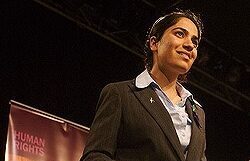Paul Sheehan, Sydney Morning Herald, July 6, 2009
A spectacular example is the life and near-death of Malalai Joya.
Malalai Joya in AustraliaFor many women, the difference between life and death is a piece of string, a clean razor blade, a fresh bandage and a bar of soap. That’s why a pitiful amount of money can save a woman, or a newborn baby, or both. And that’s why, while the Australian government is expending hundreds of millions of dollars fighting a war in Afghanistan, civilian volunteers in Australia are sending thousands of simple birthing kits (bandage, blade, string, soap, plastic sheet) to Afghanistan, because it is one of the most oppressive places in the world to be a woman.
Last Wednesday, 500 people gathered at the Four Seasons Hotel in Sydney for a glimpse of this reality. The event was sold out. The speaker was a young, attractive former member of the Afghan parliament, Malalai Joya, 31, the author of a new memoir, Raising My Voice. She gave the audience a taste of the new front line of feminism, the women fighting and dying for their freedom.
It is no coincidence that the face of the revolt against the suffocating theocracy of Iran has become a young woman, Neda Agha-Soltan, whose murder, on June 20, was recorded on a mobile phone camera, and broadcast to the world through the internet and viewed by tens of millions. She had been taking part in one of the massive street demonstrations against last month’s tainted presidential election.
Her death became a public execution, at the age of 26. When the film footage begins, Neda is sitting on the street, propped up by men holding each arm. She falls limp to the road. She is wearing blue jeans. A thin trickle of blood is seeping from her mouth. Her eyes roll upward, into a fixed stare. Blood begins to pour from her nose and mouth. People are screaming.
This is the image the mullahs of Iran and their army of street thugs, one of whom shot Neda, have given the world. It’s all on YouTube.
….
For these woman, like the women in Afghanistan and other countries where the rights of girls and women are being stripped away under the pretext of religious piety, feminism is a life and death matter. A spectacular example is the life and near-death of Malalai Joya.
She had committed no crime, had set up an orphanage and a health centre, been elected to parliament, but for her affront to the dignity of the new male-dominated institutions, for calling it a sanctuary for “warlords and theocrats” and comparing it to a zoo, she was thrown out of office by a majority vote of parliament, threatened with death, abandoned by the government, forced to move from safe house to safe house. She has survived two assassination attempts.

She is also banned from flying. To get to Australia she had to leave home under the all-enveloping burqa – a garment she describes as “disgusting” – travel by van to the Pakistan border, then by another van to a city in Pakistan, then fly to Bangkok, then to Sydney. The journey took almost three days. As the most outspoken woman in Afghanistan, she lives with the constant risk of murder.
On April 12 a leading Afghan feminist and member of the regional parliament in Kandahar, Sitara Achakzai, was abducted and then murdered by Taliban gunmen.
“My life is an example that the government Australia is supporting is telling lies,” Malalai told her audience.
This is what the Rudd Government has had to say, when pressed, about Malalai’s experience: “The Australian Government is aware of Ms Joya’s case … It strongly encourages efforts by Afghan authorities to ensure inclusive, democratic and transparent parliamentary process, including the right of elected members to voice their views under the protection of parliamentary privilege. At the same time, the Government also recognises the right of Afghan authorities to take appropriate action to defend and uphold the authority of Afghan institutions and its elected representatives. Ultimately, the Government considers that the issue of Ms Joya’s suspension is a matter for the Afghan parliament and people.”
In other words, she’s on her own.
This is what Malalai has to say about the reality of daily life for women under this new democracy: “Most women wear the burqa just to be safe, not because they want to wear the burqa … What is happening is fascism … The country is living under jungle law … No journalists go to the far provinces to see what is going on because it is too dangerous.”
She is talking about the Afghan Government Australia is endorsing, not the medieval Taliban. She believes the US-led occupation is merely legitimising an Islamic theocracy underpinned by the rule of fear.
“History has shown that we won’t accept occupation,” she told the audience. History is depressingly on her side. In the past 200 years, Afghanistan has experienced a sequence of 21 wars, civil wars, assassinations and national emergencies. No foreign force has prospered.
On Wednesday, after she finished her duties as speaker, I asked Malalai, who is married, and the eldest of seven sisters, if she had any plans to become a mother. Her expression changed, as if a veil passed across her face. She replied: “I don’t even know what is going to happen tomorrow.”